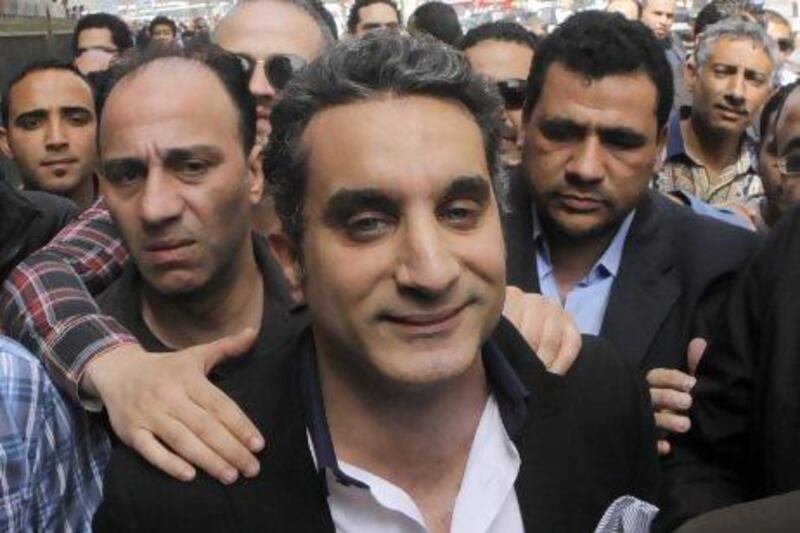CAIRO // The president, Mohammed Morsi, has insisted his government respects free expression, as controversy continued over a TV comic who was alleged to have insulted him and defamed Islam.
His office yesterday repeated it had no role in an investigation into Bassem Youssef, the host of a popular satirical show.
Mr Morsi and his aides have been on the defensive since Youssef and his production crew were questioned for five hours on Sunday in the prosecutor general's office.
In the ensuing uproar, Mr Morsi's allies first defended Egypt against what it called foreign interference.
Yesterday the president contested suggestions he or his aides ordered legal action against Youssef.
"The presidency reiterates the importance of freedom of expression and fully respects press freedom," his office said. "The current well-publicised claims were initiated by citizens."
But hours after that, prosecutors questioned another comedian for allegedly insulting Islam.
Ali Kandil was queried over remarks in a February episode of Youssef's show Al Bernameg that allegedly poked fun at the discourse and style of some Muslim clerics.
Kandil dismissed the charges as "utter nonsense" and vowed to continue to fight for freedom of expression.
"I take responsibility for every word I said," he said.
Under fire for using prosecutorial power to go after his critics, Mr Morsi has taken pains to emphasise the separation between the presidency and the judiciary.
"The prosecution's summoning of any Egyptian citizen regardless of his title or fame is the decision of the prosecutor general, who operates independently from the presidency," his office said on Tuesday.
But to Mr Morsi's critics point out that the prosecutor general was only appointed after the president issued a decree dismissing the previous prosecutor general in November.
The judiciary opposed the move and many judges went on strike because, they said, Mr Morsi had infringed on the sanctity of the rule of law.
In his freewheeling and whimsical show, Youssef uses footage of speeches and interviews to poke fun at members of the government and those he says misuse religion for political gain.
He told CNN on Monday that prosecutors had questioned him "line by line, phrase by phrase, joke by joke".
Youssef was released on bail of 15,000 Egyptian pounds (Dh8,000) for three of the charges and must return for questioning on a fourth.
By Tuesday, his case had caused a minor diplomatic incident between the US and Egypt.
Victoria Nuland, spokeswoman for the US state department, described the cases as part of a "disturbing trend" of growing restrictions on freedom of expression in Egypt.
Ms Nuland said "there does not seem to be an even-handed application of justice here".
She was referring to the government's slow investigation of police brutality and allegations that Muslim Brotherhood members had attacked people protesting against the government.
The Muslim Brotherhood's Freedom and Justice Party later said her comments represented "blatant interference" in Egyptian affairs.
The acrimony widened after the US Embassy in Cairo posted a link to a segment from the popular TV programme, The Daily Show.
In the episode, Jon Stewart lambasted Mr Morsi for allowing the infringement of freedom of speech during his tenure in office. Youssef's show is modelled on The Daily Show and he and Stewart are friends.
The November decree that led to the appointment of the current prosecutor, along with Mr Morsi's decision to rush through a vote on a controversial constitution, inspired huge protests over the past six months against the presidency and his supporters from the Muslim Brotherhood.
Protests have calmed somewhat, but the country is still on a slow boil as the economy worsens and a balanced government remains elusive because of delayed elections and political divisions.
Youssef told CNN he was undeterred by the cases filed against him and urged the presidency to focus on Egypt's pressing needs, rather than expend its efforts targeting free speech.
"They are blaming everything on the media, instead of talking about problems," he said. "President Mubarak never put someone directly into an investigation. There were other people, who were great supporters of the regime, who did that for him."
Youssef said he was a practising Muslim and that those who "claim to be the sole representers of Islam" were the ones defaming the religion.
twitter: For breaking news from the Gulf, the Middle East and around the globe follow The National World. Follow us





